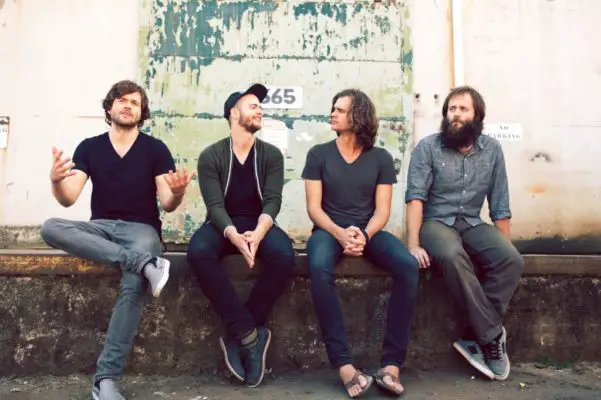I got the chance to speak with Dylan Kongos, bass player and songwriter for the world’s most popular band of brothers: Kongos. Their afro-infused, accordion-thumping rhythms have become some of the most recognizable in recent memory, with two smash singles, including Come With Me Now, which topped out at number 31 on Billboard’s Hot 100. We spoke about his favorite cult movie, how to pronounce that Greek name, and their unique philosophical perspective on ‘kids these days:’
I’m going to start out with a bit of musical association to try to understand where you guys come from artistically. Just give me the first thing that pops into your head when I describe the following scenarios:
You’re on a long drive. You can pick one artist to listen to. Who is it?
I think I would have to say Ray Charles. I could listen to some of his records over and over again.
Sunday Morning. Reading the Newspaper. What’s lightly playing in the background?
Bob Marley.
Your first child is born. What is the first song you’ll show him?
Ravel. Actually, I don’t know, maybe St. Matthew’s Passion by Bach. Just something purely instrumental and harmonically rich.
A friend says, “I’m looking for some new music. What’s the best song out right now?” How do you respond?
I’ve recently been listening to Punch Brothers. They’ve got a bluegrass line-up but not really bluegrass music. It’s entirely different. I’d tell him to give it at least five songs. You need to let it grow on you.
Bored on a Tuesday night and you decide to watch a cult movie. What do you choose?
Tuesday Night? Gotta go Grandma’s Boy.
Cool. So from what I’ve gathered, you guys are all brothers. Your father was a singer-songwriter with more than moderate chart success throughout the 70s. You grew up in London and South Africa, you are of Greek heritage, and you are based in Phoenix, Arizona. How has this amalgam of people, places, and culture influenced Kongos?
Obviously, everybody is influenced by everything around them, their circumstances and such. You see, in South Africa there is this really tacky music. It’s tacky but it’s not cheesy. That is something we try to strive for. We want to make joyful music that doesn’t really make you cringe.
We come from so many different places because our parents tried to expose us to a lot of different cultures. Like my dad was showing us records from all over the place. I think it makes us different. We don’t really show allegiance to a country or a place. We never really judge anyone’s culture. Things that sound funny to others, don’t really sound funny to us.

Instrumentally you can definitely hear all of that culture on the debut record, Lunatic. Now, the first two singles from that record are I’m Only Joking and Come With Me Now. They are most certainty not standard songs that you would associate with the Billboard Hot 100. How did you end up with those as your lead singles?
It’s a bit of a funny story. Originally, we released those and emailed them to a bunch of radio stations. Nothing happened in the States, but a program director for a very big station in South Africa picked up I’m Only Joking. We sent him like three or four tracks, but that was the one he decided to play to the huge listener base. That’s basically why I’m Only Joking was picked.
It ended up being the same in the States too. A Chicago station picked up I’m Only Joking. Then a Denver station picked up Come With Me Now because we were playing some live sets. Then it was picked up on in Seattle on a pretty influential station and that sorta got the ball rolling for Come With Me Now. It was all a bit of happenstance and a bit of luck. Still, Come With Me Now is one of the most commercial tracks off of the record so it sorta makes sense but it wasn’t really planned.
Now, the success of those songs was a bit belated from their respective releases. What is that like? Do you feel like you’re waiting?
A little bit, but we don’t listen to our music. We play it live and that invigorates the songs. Playing it in a different city, every night for different people, definitely gives the songs new life. It doesn’t get boring – well at least it hasn’t gotten boring yet. Maybe one day it will.
In those two singles, and the rest of the album, there seems to be a bit of musical anger and might. What were you trying to convey musically with this record?
Well, I’d be lying if I said there was some theme tying the record together. We all brought these songs to the group and we just kept the songs that seemed to fit together. They all have the sound of Kongos, but they are all very different.
Ideologywise, I feel like there is a loose track lyrically. I mean the songs were all written at different times so different things influenced us, individually. We say that we record singles, and when you have enough singles you create an album.
It’s not really a concept album. Maybe we’ll do a concept album one day. I’d love to do that. I love Roger Waters and his work with the concept album.

You mention a loose lyrical thread. To me, it seems to be a condemnation of the youth of today, with such songs as Sex on the Radio, As We Are, and Kids These Days. It seems to be a very adult perspective, or outside perspective, on a culture that you are actively involved in. How did you guys come to this unique perspective?
I see what you are saying. It’s not really the youth as much as modern life. I think most people try to reconcile modern technological life and actually experiencing something. Like you could look at a picture or you could actually submerse yourself in something. The fact is that we are all animals and we create a society that rewards and promotes certain animalistic tendencies within whatever technology we are using. It makes people feel very anxious. I think that’s what behind it all.
Staying on the topic of lyrics, I noticed on the About section of your website there is a bit of humor:
Pronounced “KONGOS” – KONGOS is spelled like this:
” K” for Cool, “O” for Awesome, “N” for Knowledge, “G” for Jenius, “O” for Artistic, “S” for speling
There’s no “The” in KONGOS.
There is however a “the” in “THEre.”
It’s not KONGO’s, it’s not Congos, congas, kongus, kongas, or Jeff.
No relation to Cheick Kongo, the conga drum, the Kongo people of Africa, Donkey Kong, Kongos Norman, Kongos pizza, Kongos Club in Oklahoma, twitter.com/kongos, Kat Kongos, Lasse Kongos, the japanese class of battleship or Kevin Bacon.
I assume you guys wrote that?
Yes we did. It’s all from the fact that nobody knows how to pronounce the name. We pronounce it Kongis. It’s from different Greek roots, but we’ve adopted the American pronunciation of Kongos.
Anyhow, there is definitely some humor here. Does humor play any role in the lyrical process for the band?
Absolutely. I think the idea of taking ourselves too seriously annoys the shit out of us. We take the job seriously, but we are just a bunch of dudes playing some songs. We don’t want to blow that out of proportion. We’re also brothers and always want the opportunity to cut each other down.
To finish up on lyrics, what is your favorite song lyrically on the LP?
Favorite? I think I’d have to say…I actually have no idea. I have no idea lyrically or rhythmically. It’s an interesting topic.

Jumping back to the idea of musical association from the beginning. What is an example of an artist or song whose lyrics have always provoked you to think?
I think pretty much all Paul Simon’s Graceland album. He’s probably my favorite lyricist. The lyrics to I Know What I Know, from that record, are pretty incredible. The title track is great too. I feel like that is lyrically unique. He has such a crystalized style of writing lyrics. I’m not even sure what he’s singing about half the time, but it always sits with you.
Now, I want to get some insight into the band’s creative process. I believe that you had a large part in writing Kids These Days. Could you walk us through your creative process on Kids These Days?
At the time I was listening to all of this Ethiopian music by Mahmoud Ahmed. He uses a very specific scale and mode in that music. It’s like a weird pentatonic scale. That gave me the little riff in Kids These Days. That was the basis for the song.
Lyrically, I think at the time elections were going on. I was watching a lot of news. I was thinking about the news more historically and more cyclically. The basis of the lyrics is that we are often unaware of what part of a cycle – natural or not – that we are taking part in. It’s like the Woodrow Wilson idea that WWI was going to be ‘the war to end all wars.’ Ideas like that are proven wrong because they don’t realize the grander picture of which they are part.
We’ll finish with a cliché: what is Kongos looking to do on their next record?
We haven’t been thinking of the album too much yet. We have some new music, but we’re too concerned with what is going on right now. I think it will be a bit of departure. We want to make something big. We want to be the biggest band in the world, but I’m sure a lot of other bands want to too. But who knows? In the recording process, things always change. We’ll have to wait for the record to come out.
Pick up Kongos debut record Lunatic on iTunes or their website.
Check out their music video to their hit Come With Me Now here.


